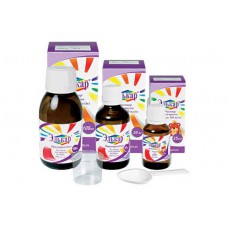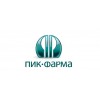Expiration date: 05/2026
Composition and form of issue:
Oral solution, 1 ml contains active substance:
levocarnitine (carnifite) 300 mg
excipients: citric acid monohydrate — 1, 2 mg methylparahydroxybenzoate — 0, 5 mg, propylparahydroxybenzoate — 0, 2 mg of purified water — up to 1 ml
in dropper bottle in dark glasses to 25 ml in a cardboard pack 1 bottle
in plastic bottles of 25 ml in a pack of cardboard 10 or 20 bottles
in 50 ml bottles of dark glass with a measuring spoon of 5 ml nominal volume and with a risk marked "1/2" (which corresponds to 2, 5 ml) or with a measuring spoon of 5 ml nominal volume with risks marked "1/4" and "1/2" (which corresponds to 1, 25 and 2, 5 ml) in a pack of cardboard 1 bottle
in dark glass bottles of 100 ml with a measuring Cup of 20 ml in a pack of cardboard 1 bottle.
Characteristic:
L-carnitine is a natural substance related to b Vitamins.
Pharmacokinetics:
It is well absorbed in the intestine, the concentration in blood plasma reaches a maximum after 3 hours and remains in the therapeutic range for 9 hours. Easily penetrates the liver, myocardium, slower — in the muscles. It is excreted by the kidneys, mainly in the form of acyl esters.
Description of pharmacological action:
Participates in metabolic processes as a carrier of long-chain fatty acids (palmitic, etc.) from the cytoplasm to the mitochondria, where these acids undergo a process &beta-oxidation to form adenosine triphosphate and acetyl-COA. Improves protein and fat metabolism, increases secretion and enzymatic activity of gastric and intestinal juices, improves food absorption, reduces overweight and reduces fat content in muscles. Increases resistance to physical activity, inhibits the formation of keto acids and anaerobic glycolysis, reduces the degree of lactic acidosis, promotes economical consumption of glycogen and increases its reserves in the liver and muscles.
It has an anabolic and lipolytic effect. Normalizes increased basal metabolism in hyperthyroidism: it is a peripheral (indirect) antagonist of thyroid hormones, and not a direct inhibitor of thyroid function. It improves metabolism and energy supply of tissues.
Indications:
As part of complex therapy:
- intensive physical and psycho-emotional stress to improve performance, endurance, reduce fatigue, including the elderly
- in the period of rehabilitation after diseases and surgical interventions, injuries, including to accelerate tissue regeneration
- complex therapy of chronic gastritis and chronic pancreatitis with reduced secretory function
- complex therapy of skin diseases (psoriasis, seborrheic eczema, focal scleroderma and discoid lupus)
- mild hyperthyroidism
- neurological manifestations in vascular, toxic and traumatic brain lesions
- anorexia nervosa syndrome
- diseases accompanied by a lack of carnitine or its increased loss (myopathy, cardiomyopathy, mitochondrial diseases, hereditary diseases with concomitant mitochondrial insufficiency) - to fill its deficit, as part of the complex therapy
- in pediatric practice (treatment of children under 3 years, under the supervision of a doctor): in nursing premature infants, newborns who have suffered birth trauma or asphyxia, children with sluggish sucking reflex and low weight gain reduced muscle tone, with insufficient development of motor and mental functions, as well as to prevent these disorders in children "at risk" with stunting and lack of body weight in children and adolescents up to 16 years
- in adults in sports medicine and in intensive training (during the training process in the development of aerobic performance): to improve speed-strength performance and coordination of movements, to increase muscle mass and reduction of body fat, to prevent post-training syndrome (acceleration of recovery processes after exercise), with traumatic injuries to accelerate muscle regeneration.
Contraindications:
Individual intolerance.
Use during pregnancy and breast-feeding:
Due to the lack of research use during pregnancy and lactation is not recommended.
Side effect:
Possible allergic reactions, gastralgia, dyspepsia, myasthenia gravis (in patients with uremia).
Drug interaction:
GCS contribute to the accumulation of the drug in the tissues (except the liver), other anabolics enhance the effect.
Dosage and administration:
The drug is used as part of complex therapy.
Inside, 30 minutes before eating, further diluting with liquid.
At long physical and psycho-emotional loads: from 0, 75 g (1/2 measuring spoon or 2, 5 ml) 3 times a day to 2, 25 g (1, 5 measuring spoon or 7, 5 ml) 2-3 times a day.
In nervous anorexia, as well as during rehabilitation after illness and surgery and injuries: 1, 5 g (1 scoop or 5 ml) 2 times a day. The course of treatment — for 1-2 months.
In the treatment of chronic gastritis and chronic pancreatitis with reduced secretory function: 0, 375 g (1/4 scoop or 1, 25 ml) 2 times a day. The course of treatment — for 1-1. 5 months.
For the treatment of skin diseases: 0, 75 g (1/2 scoop or 2, 5 ml). The course of treatment — for 2-4 weeks.
With mild hyperthyroidism: 0, 25 g (13 drops) 2-3 times a day. The course of treatment is 20 days. The course of treatment is repeated after 1-2 months of a break or prescribed for 3 months without a break.
In vascular, toxic and traumatic brain lesions: 0, 75 g (1/2 scoop or 2, 5 ml) per day. The course of treatment — for 3-5 days. If necessary, after 12-14 days, appoint a second course.
In diseases accompanied by a lack of carnitine (primary and secondary carnitine insufficiency): up to 50-100 mg/kg (2-5 drops/kg) body weight with a multiplicity of 2-3 times a day. The course of treatment — for 3-4 months.
Children are prescribed as an additive to sweet dishes (kissel, compote, juice). Children under 3 years dose is determined by the attending physician. From 3 to 6 years — in a single dose of 0, 1 g (5 drops) 2-3 times a day, in a daily dose of 0, 2-0, 3 g (11-16 drops). The course of treatment — 1 month. Children from 6 to 12 years — in a single dose of 0, 2-0, 3 g (11-16 drops) 2-3 times a day, in a daily dose of 0, 4-0, 9 g (22-48 drops). The course of treatment — at least 1 month.
Growth retardation: 0, 25 g (13 drops) 2-3 times a day. The course of treatment is 20 days. The course of treatment is repeated after 1-2 months of a break or prescribed for 3 months without a break.
In sports medicine and intensive training: 2, 5 g 1-3 times a day (daily dose 2, 5-7, 5 g) in the case of use for therapeutic purposes — 70-100 mg/kg/day (5-7, 5 g/day). The course of reception — 3-4 weeks in the pre-competition period. During the training process — up to 6-8 weeks.
Overdose:
Symptoms: dyspeptic disorders, myasthenic disorders (in patients with uremia).
Treatment: gastric lavage, administration of activated charcoal.
Special instruction:
Treatment of children under the age of 3 years to carry out under the supervision of a doctor. The drug does not affect the performance of potentially dangerous activities that require special attention and rapid reactions (driving and other vehicles, working with moving mechanisms, the work of the dispatcher, operator, etc.).
Storage conditions:
After opening — in the refrigerator for 2 months.





